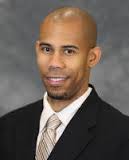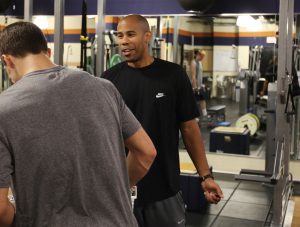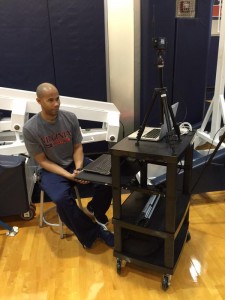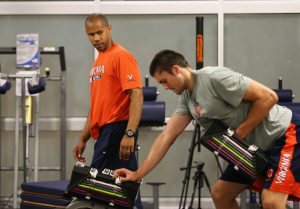 With great excitement we introduce our second presenter for The 2016 Seminar, University of Virginia’s Head Strength Coach, Mike Curtis. Mike Curtis is in his seventh year as head strength and conditioning coach for men’s basketball at Virginia. He was named to the position on May 11, 2009. Before accepting the position at UVa, Curtis was the director of strength and conditioning for the Michigan athletics department. At Michigan, Curtis supervised and managed the training efforts of more than 20 athletic teams, five assistant coaches and two training facilities. He was primarily responsible for the implementation of performance training programs for men’s and women’s basketball.
With great excitement we introduce our second presenter for The 2016 Seminar, University of Virginia’s Head Strength Coach, Mike Curtis. Mike Curtis is in his seventh year as head strength and conditioning coach for men’s basketball at Virginia. He was named to the position on May 11, 2009. Before accepting the position at UVa, Curtis was the director of strength and conditioning for the Michigan athletics department. At Michigan, Curtis supervised and managed the training efforts of more than 20 athletic teams, five assistant coaches and two training facilities. He was primarily responsible for the implementation of performance training programs for men’s and women’s basketball.
Curtis, a former basketball player at Virginia, was the head strength and conditioning coach for the Memphis Grizzlies of the National Basketball Association for six years (2002-08) before assuming his responsibilities at Michigan.
He also served as the basketball strength and conditioning coach at South Carolina for one year (2001-02) and was the director of strength and conditioning for Olympic sports at Dayton for one year (2000-01).
Curtis, who is from Richmond, Va., earned a bachelor’s degree in sports medicine from Virginia in 1998 and a master’s degree in exercise physiology from UVa in 2000. He lettered four times as a member of the Cavaliers’ men’s basketball team and was a team co-captain for the 1997-98 season.
Curtis also serves as the head strength and conditioning coach for the Virginia women’s basketball team.
JD: If you could, please give our readers a little background information about you, what your niche in the world of athletics is, accomplishments, how you got there, education, any products you have available and/or notable publications.
 MC: My background – Much of my life has been here in the state of Virginia. I actually grew up in Richmond, moved on to the University of Virginia to earn undergraduate and graduate degrees in sports medicine and exercise physiology while also managing life as a student-athlete. After completing my master’s degree my professional journey took me to Dayton, OH, Columbia, SC, Memphis, TN, Ann Arbor, MI and now back to Charlottesville. During that journey I was fortunate to have had the opportunity to meet and learn from some really great mentors and friends. A short list of them includes Erik Helland, Mike Gattone, Al Vermeil, Tony Decker, Jerry West, Darryl Eto, Gary Gray, and Charlie Weingroff,
MC: My background – Much of my life has been here in the state of Virginia. I actually grew up in Richmond, moved on to the University of Virginia to earn undergraduate and graduate degrees in sports medicine and exercise physiology while also managing life as a student-athlete. After completing my master’s degree my professional journey took me to Dayton, OH, Columbia, SC, Memphis, TN, Ann Arbor, MI and now back to Charlottesville. During that journey I was fortunate to have had the opportunity to meet and learn from some really great mentors and friends. A short list of them includes Erik Helland, Mike Gattone, Al Vermeil, Tony Decker, Jerry West, Darryl Eto, Gary Gray, and Charlie Weingroff,
In regards to my niche in the world of athletics I would guess most people would say that my niche is specific to physical preparation for basketball given that I have primarily trained basketball athletes the past 16 years. I spent 6 years working in the NBA before deciding that the collegiate environment was ultimately more fulfilling based on my passion for the process of developing athletes physically as well as emotionally. I have also worked with a fair amount of Olympic sports with significant experience in soccer during my stints with the University of Dayton, University of Michigan, and my graduate assistantship with UVA.
Accomplishments? My greatest accomplishment to this point has been becoming a father. I doubt I will ever experience any thing professionally or personally that will trump that. In regards to coaching and athletics I don’t know that I have any personal accomplishments per se. I would say that I have been fortunate enough to have shared in the many accomplishments of the athletes I have been privileged to train. The teams I have worked with have made NBA playoffs, won ACC regular season and conference championships, reached NCAA sweet sixteen, produced NBA draft picks, national team members, and Olympic medalist. I have been humbled to have simply been a supporting piece for some of their successes.
JD: Discuss with us the mistakes you see made by strength and conditioning coaches in the United States and around the world, and what you feel should be done differently/how to correct these issues.
 MC: It’s hard to discuss mistakes at large in the profession when I feel that I have made so many mistakes along the way. I still continue to make them, fortunately they are a lot less frequent and of lesser magnitude. The one thing I will say is that mistakes are necessary for professional and personal growth if you are self-aware and have a growth mindset.
MC: It’s hard to discuss mistakes at large in the profession when I feel that I have made so many mistakes along the way. I still continue to make them, fortunately they are a lot less frequent and of lesser magnitude. The one thing I will say is that mistakes are necessary for professional and personal growth if you are self-aware and have a growth mindset.
I do think that many strength and conditioning coaches lose sight of what the primary objective(s) is in regards to the terminal outcomes of the training processes. I believe our jobs are to develop or enhance the physical qualities that are necessary to more efficiently and effectively express skills in the sport in which they compete. With that being said, I see many coaches solely or predominantly focusing their philosophical approach and implementation on a singular paradigm, methodology, or means. When I was a younger coach I had a myopic view of training and my identity. I pretty much attempted to make all my athletes weightlifters and hoped that those methods would prepare them for their sport. I still see myopic approaches quite frequently unfortunately. I think too many people identify with a singular approach and in many ways that can limit their effectiveness as a coach. Dependent on the sport, the athlete, their genetic make-up, training history, and motivation a singular training approach may not elicit the best preparation or readiness to compete. Much like the government initiative in our inner city schools I try my best to subscribe to a pursuit of “No Athlete Left Behind”. My goal is to make sure that a trainable physical quality is never the rate-limiter to an athletes’ potential to earn minutes and find competitive success. Is the success rate 100%? Absolutely not, but I try to approach every day in such a way to pursue that particular objective.
I encourage all strength and conditioning professionals to be open-minded and study training models and disciplines outside of their comfort zones. I’m not saying you have drink every flavor of Kool-Aid and change who you are, but at least evaluate what may be useful in your tool box in the event you encounter an unexpected road block during the training process and need it. I like to challenge anyone who has been an intern or graduate assistant here to expand their experiences and knowledge beyond what they are exposed to in our environment. The end goal is to be a more complete strength and conditioning professional.
I will also comment on the importance of finding the balance between technology, data, and coaching intuition. I am a firm believer and user of technology and data to help drive our decision making in the overall training process but I think its important that coaches who wish to employ these tools must first have a general sense of what they are looking for and what questions they want answered. I believe your intuition and experiential knowledge as a coach should initially set up your training goals, process and execution. The technology and data should primarily validate your practices and/or direct you towards more effective means. Too often I think people collect data to collect data and it ultimately can distract good coaches from being good coaches.
JD: What advice would you give a coach to improve knowledge in the lines of continuing education, meaning could you point our readers in a direction to find the scientific and practical information to improve the methods they use to improve performance?
 MC: Obviously attending seminars like CVASPS are great places to network and discuss all things training with really intelligent people.
MC: Obviously attending seminars like CVASPS are great places to network and discuss all things training with really intelligent people.
Even more obvious would be reading as much current and past training related literature as digestible. It’s of great importance to understand the theory, principles, definitions, and facts behind what we are probably going to hear in the most dense and high quality presentations. The only way to practically apply that information is to have some idea of what the content is. You can’t practically apply anything Cal Dietz, Landon Evans, or Jim Snider talks about unless you can have some foundational understanding of what they are saying. That can be difficult at times if you haven’t done some homework.
I believe Siff, Yessis, Harre, Bondarchuk, Issurin, etc among others are good authors to build your library. Fortunately many of their texts are available onsite at your seminar.
I would also suggest reading books that are outside the realm of strength and conditioning like management, leadership, or motivational materials. I have found them to be especially helpful in developing the training environment/culture, communication, and relationships. We can’t forget there is a blend of art and science to what we do as coaches and the aforementioned components are critical to creating a scenario where athletes can, in Charlie Weingroff’s words “absorb and adapt” to the stressors the world and we impose on them on a daily basis. It’s not always physiological mechanisms that drive adaptation to stress, it’s also psychological mechanisms and the training environment and mental coping skills play a significant role. I’ve seen some really smart strength and conditioning coaches under-achieve because they failed in creating a good training environment and developing a connection/trust with the athletes they work with.
JD: If you could give a brief description of what our attendees can expect from you at The Seminar?
MC: I believe attendees can expect an open and honest discussion of the theory and application of what it is that we are trying do with technology, intuition, culture, and sound training principles to prepare our athletes for sport. There are days where I wonder if we are on the right path and I’ll discuss where I feel we are lost or made mistakes and where we have done things well. Hopefully I can give attendees something to take back with them and utilize on Monday morning either practically or organizationally. Hopefully attendees will also provide me some things to take back to improve our training system as well.
We are hoping to provide the best possible content for strength coaches with each of our shows. If feel this could provide value for anyone else in the strength and conditioning field please feel free to share.
Enjoy the content? Then you should check out The Strength Coach Network!
You can find sensational content just like this in The Strength Coach Network. As a member of The Strength Coach Networks, you can access over 200 hours of the highest-level lecture content just like this one for 48 hours for only $1. Follow the link below to sign up and use the code CVASPS at check out to get a 48 hour trial for only $1. Check out The Strength Coach Network Here! https://strengthcoachnetwork.com/cvasps/
#StrengthCoach, #StrengthAndConditioningCoach, #Podcast, #LearningAtLunch, #TheSeminar, #SportsTraining, #PhysicalPreparation, #TheManual, #SportTraining, #SportPerformance, #HumanPerformance, #StrengthTraining, #SpeedTraining, #Training, #Coach, #Performance, #Sport, #HighPerformance, #VBT, #VelocityBasedTraining, #TriphasicTraining, #Plyometrics

